- Home
- Kristin Harmel
The Sweetness of Forgetting Page 19
The Sweetness of Forgetting Read online
Page 19
“We are French,” her father said tersely, opening his eyes. “They are not deporting French.”
“But they are,” Rose whispered. “And Maman is not French. To them, she is still Polish. In their eyes, that makes her—and us—foreigners.”
“You are talking nonsense, child,” her father said.
“This roundup is going to be different,” Rose said. She felt like she’d said it a thousand times before, but her father wasn’t hearing her because he didn’t want to. “They are coming for all of us this time. Jacob says—”
“Rose!” her father interrupted, slamming his fist on the table. Beside him, Rose’s mother jumped, startled, and shook her head sadly. “That boy has a runaway imagination!”
“Papa, it’s not his imagination!” Rose had never spoken against her parents before, but she had to make them believe her. This was life and death. How could they be so blind? “You’re our father, Papa. You have to protect us!”
“Enough!” her father roared. “You will not tell me how to run my family! That boy, Jacob, will not tell me how to run my family! I am protecting you children, and your mother, by following the rules. Do not tell me how to be a parent! You know nothing of such things.”
Rose fought back the tears in her eyes. She put her right hand on her belly, without intending to, and she quickly moved it back to her side when she saw her mother look at her curiously and frown. She wouldn’t be able to hide it from them for much longer, and then they would know. Would they forgive her? Would they understand? Rose thought not.
She wished she could tell them the truth. But now wasn’t the time. It would only complicate matters. Before she did anything, she needed to save them.
“Rose,” her father said after a moment. He stood and walked over to where she sat. He knelt beside her, the way he used to when she was a little girl. She remembered, in that moment, the way he’d been so patient with her when he’d taught her to tie her shoelaces, the way he’d comforted her the first time she skinned her knee, the way he’d pinched her cheeks when she was just a little girl and called her ma filfille en sucre, my little girl made of sugar. “We will do what they say. If we follow the rules, everything will be fine.”
She looked into his eyes and knew in that moment that she would never change his mind. And so she wept, for she had already lost him. She had already lost them all.
When Jacob came for her later that night, she wasn’t ready. How could she ever be ready? She gazed into his gold-flecked green eyes, which had always reminded her of a magical ocean, and thought about how she could get lost there forever. Her own eyes filled with hot, stinging tears as she realized she might never sail those seas again.
“Rose, we must go,” he whispered urgently. He took her in his arms and tried to absorb her sobs with his body.
“But how can I leave them, Jacob?” she whispered into his chest.
“You must, my love,” he said. “You must save our baby.”
She looked up at him. She knew he was right. There were tears in his eyes too. “Will you try to protect them?” she asked.
“With every ounce of my being,” Jacob vowed. “But first I must protect you.”
Before they left, she slipped into the room Alain and Claude shared. Claude was sleeping soundly, but Alain was wide awake.
“You’re leaving now, aren’t you, Rose?” Alain whispered when she drew close.
She sat down on the side of his bed. “Yes, my dear,” she whispered. “Will you come with us?”
“I must stay with Maman and Papa,” Alain said after a moment. “Maybe they are right.”
“They are not,” Rose said.
Alain nodded. “I know,” he whispered. He paused for a moment and then wrapped his arms around her. “I love you, Rose,” he whispered.
“I love you too, my little man,” she replied, pulling him tightly to her. She knew Alain didn’t understand why she was leaving him. She knew it seemed to him as if she was choosing Jacob over her family. But she couldn’t tell him about the baby growing within her. He was eleven, too young to understand. She hoped that someday, he would realize that she felt as though her heart were being ripped in two.
Thirty minutes later, Jacob led her through an alleyway, where his friend Jean Michel, who was part of the resistance movement, waited outside a darkened doorway.
Jean Michel kissed Rose hello on both cheeks. “You are very brave, Rose,” he said simply.
“I am not brave; I am frightened,” she replied. She did not want anyone to think she was brave. To think that it was brave to leave her family behind was absurd. She felt, in that moment, like the worst human being on the earth.
“May we have a moment alone?” Jacob asked Jean Michel.
Jean Michel nodded. “But quickly, please. There isn’t much time.” He slipped through the doorway, leaving Rose and Jacob alone in the darkness.
“You are doing the right thing,” Jacob whispered.
“It does not feel that way anymore,” Rose said. She took a deep breath. “You are completely sure? About this roundup?”
Jacob nodded. “I’m certain. It’s beginning in a few hours, Rose.”
She shook her head. “What has happened to us?” she asked. “To this country?”
“The world has gone mad,” Jacob murmured.
She took a deep breath. “You will come back for me?”
“I will come back for you,” Jacob said immediately. “You are my life, Rose. You and our baby. You know that.”
“I know,” she whispered.
“I will find you, Rose,” Jacob said. “When all of the horrors are over, and you are safe, I will come for you. I give you my word. I will not rest until I am beside you again.”
“Nor will I,” Rose murmured.
He pulled her to him, and she breathed in the scent of him, memorized the feel of his arms around her, pressed her head against his chest, and wished she never had to let go. But then Jean Michel was back, and he was gently pulling her away from Jacob, softly telling her that they had to go now, before it was too late. She knew only that Jean Michel, a Catholic, was taking her to another man who was part of a resistance, a man named Ali, who was a Muslim. It was the sort of thing that would have made her smile—Catholics, Jews, and Muslims working together as one—had the world not been falling down around them.
Jacob pulled her to him once more, for one more long kiss good-bye. As Jean Michel led her away, she pulled away from him. “Jacob?” she called softly into the darkness.
“I’m here,” he said. He reappeared from the shadows.
She took a deep breath. “Go back for them. Please. My family. I can’t lose them. I can’t live with myself if they perish because I did not try hard enough.”
Jacob stared into her eyes, and for a moment, Rose wanted to take the words back, because she knew what she was asking. But there wasn’t time. He nodded and said simply, “I will go back. I promise. I love you.”
And then he was gone into the inky darkness. Rose stood paralyzed, rooted to the spot, for what felt like an eternity but was only a few seconds. “No,” she murmured to herself. “What have I done?” She took a step after Jacob, meaning to stop him, meaning to warn him. But Jean Michel wrapped his arms around her and held tight.
“No,” he said. “No. It is in God’s hands now. You must come with me.”
“But . . .” she protested, trying to pull away.
“It is in God’s hands,” Jean Michel repeated as sobs began to rack Rose’s body. He held her more tightly and whispered into the darkness, “For now, all we can do is pray and hope that God can hear us.”
It was torture, after that, to live in Paris in secret, knowing that within a mile or two, her family or Jacob might also be in hiding. Knowing that she could not reach out to find them, that her one responsibility now was protecting the child within her, made her weep with helplessness every night.
The people who took her in, the Haddams, were kind, although she knew th
e mother and the father did not want her there. She was, after all, a liability; she knew her very presence put them in danger. If not for the baby she had vowed to protect, she would have left long ago, out of politeness. Still, they were hospitable, and over time, they seemed to accept her. Their boy, Nabi, reminded Rose of Alain, and this was what kept her sane most days; she could talk to him the way she had once talked to her little brother, and in that way, this new home felt a little more like the one she’d left behind.
She and Madame Haddam spent many hours in the kitchen, and after a while, Rose had the courage to offer Madame Haddam some of the recipes from her own family’s ashkénaze bakery. Madame Haddam, in turn, taught Rose to make many delicious pastries that she’d never heard of before.
“You should know how to cook with rosewater,” Madame Haddam had told her one day. “It is only fitting for a girl named Rose.”
And so Rose fell in love with the almond crescents and the orange blossom baklava and the rosewater cookies that crumbled in her mouth like magic, and these were the foods that nourished the baby within her. Her father had often said negative things about the Muslims, but Rose knew now that he’d been just as wrong about religion as he had been about the intentions of the Nazis. The Haddams had put their own lives at risk to save hers. They were some of the best people she had ever known.
Furthermore, Rose knew that in order to make pastries like the ones the Haddams made, one had to be good and kind. One’s heart always came out in the baking, and if there was darkness in your soul, there would be darkness in your pastries too. In the Haddams’ pastries, though, there was light and goodness. Rose could taste it, and she hoped the baby growing inside her could too.
Sometimes, Madame Haddam would let Rose accompany her to the market, as long as Rose vowed not to speak and veiled herself with a scarf. She liked the anonymity it gave her, and at the market, even though the Haddams shopped in a Muslim neighborhood, Rose would scan the crowd desperately, hoping for a glimpse of someone from her old life. One day on the street, she saw Jean Michel, but she couldn’t yell for him because of the sudden lump in her throat. By the time she could make a sound again, he was long gone.
One evening, after saying the Salah in Arabic with the Haddams, Rose was in her own room praying in Hebrew when she turned around and saw Nabi watching her. “Come, Nabi,” she said to the boy. “Pray with me.”
He knelt beside her while she finished her prayers, and then they sat together in silence. “Rose?” he asked after a long while. “Do you think God speaks Arabic or Hebrew? Can he hear your prayers or mine?”
Rose considered this for a moment and realized that she did not know the answer; she had begun to doubt recently that God could hear her at all, no matter what language she spoke. For if he could hear her, how could he allow her family and Jacob to vanish from her life? “I do not know,” she said finally. “What do you think, Nabi?”
The boy thought about this for a long time before replying. “I think God must speak all the languages.” His tone was confident. “I think he can hear all of us.”
“Do you think we are all praying to the same God?” Rose asked after a moment. “Muslims and Jews and Christians and all the people who believe in other things?”
Nabi appeared to be considering this question quite seriously too. “Yes,” he finally told Rose. “Yes. There is one God, and he lives in the sky, and he hears all of us. It is just that here on earth, we are confused about how to believe in him. But what does it matter, as long as we trust he is there?”
Rose smiled at that. “I think perhaps you are right, Nabi,” she said. She thought of the words Jean Michel had spoken to her the last time she saw Jacob. “For now,” she said softly to the young boy, reaching out to ruffle his hair, “all we can do is pray and hope that God can hear us.”
Chapter Seventeen
After persuading the gate agent to take us after the required check-in time, rushing through security, and running to our gate, Alain and I make it onto our flight five minutes before they close the cabin doors.
I’d used Alain’s cell phone to call Annie from the taxi, but she didn’t answer. Nor did Gavin or Rob, both of whom I tried. Mamie’s home had no new information about her condition, and the nurse I reached at the hospital said that my grandmother was stable, but that it was impossible to tell how long she’d stay that way.
As we taxi down the runway and take off over Paris, I watch the Seine disappear beneath us, a ribbon cutting through the land, and I imagine Mamie hiding on a barge at the age of seventeen, slowly snaking down the same topaz river to the unoccupied zone. Is that how she’d gotten out of Paris? I wonder whether we’ll ever really know.
“What do you think happened to the baby she was carrying?” Alain asks me softly as we climb higher into the sky. We’re above the clouds now, with sunlight filtering down all around us, and I can’t help but wonder whether this is a bit like what heaven looks like.
I shake my head. “I don’t know.”
“I should have guessed that she was with child,” Alain says. “It explains why she left us. That never made sense to me. It would not have been in her nature to run and leave us behind. She would have stayed to try to persuade us, to try to protect us, even if it meant risking her own life.”
“But she believed it was more important to protect the baby,” I murmur.
Alain nods. “And it was. She was right. That is what it means to be a parent, is it not? I think it was the same with my parents. They truly thought that following the rules would protect us all. Who could have known that their best intention would lead where it did?”
I shake my head, too sad to speak. I can’t imagine the feeling of horror my great-grandmother must have felt when Danielle and David were torn from her. Had she been able to stay with the oldest, Helene, after they separated the men and the women? Had she lived long enough to suffer the anguish of realizing that all her children had been lost? Had my great-grandfather regretted not listening to his daughter’s words of warning? What would it feel like as a parent to realize too late that you’d made a terrible, irreversible mistake and that your children were going to die for it?
I stare out the window for a long moment and turn back to Alain. “Maybe my grandmother couldn’t care for the baby. Maybe the baby was born and she put it up for adoption.” I don’t really believe the words, but it feels better to say them.
“Impossible, I think,” Alain says. He frowns. “If the baby was a piece of her and Jacob, I cannot imagine there is any way she would have parted with the child.” He looks at me sideways and adds, “You are absolutely certain there is no chance the baby was your mother?” he asks.
I shake my head. “When my mother died a couple of years ago, I had to get her estate in order,” I say. “I remember looking at her birth certificate. It clearly said 1944. Plus, she looked a lot like my grandfather.”
Alain sighs. “The baby must have died, then.”
I look away. I can’t imagine anything sadder. “But to think she would get pregnant again so soon after . . .” I add, my voice trailing off. I can’t understand that piece of the puzzle.
“That is not as unusual as it sounds,” Alain says softly. He sighs again and turns to look out the window. “After the war, many Shoah survivors married and tried to have babies right away, even the ones who were malnourished and had no money.”
I look at Alain, surprised. “But why would they do that?”
“To create life when everything around them was death,” he says simply. “To be a part of a family again, after they’d lost everyone they’d ever loved. By the time Rose met your grandfather, she must have thought that all of us, including Jacob, were dead, and if she had lost the baby too, she must have felt very, very alone. Maybe she just wanted to create a family so that she’d have a place in the world again.”
It takes an eternity to get our bags, get through customs, and retrieve my car from the parking garage, but eventually, we’re on our w
ay to the Cape. We’re out of Boston just before rush hour hits, and as we hurtle south on Route 3, I take my chances, weaving in and out of traffic at twenty miles over the speed limit.
I call Annie on the way, and this time, she answers. Her voice sounds hollow, but she tells me she’s at the hospital, and that there hasn’t been any change in Mamie’s condition.
“Is your dad with you?” I ask.
“No,” she says without elaborating.
I can feel my blood pressure rising. “Where is he?”
“Don’t know,” she says. “Maybe at his office.”
“Did you ask him to go with you to the hospital?”
Annie hesitates. “He was here earlier. But he had to leave to get some work done.”
It physically hurts my heart to hear her say that. I want nothing more than to protect my daughter, and it seems that the last place in the world I should be looking for potential harm is from her other parent.
“I’m sorry, honey,” I say. “I’m sure your dad must be very busy. But he should have stayed with you.”
“It’s fine,” Annie mumbles. “Gavin’s here.”
My heart lurches. “Again?”
“Yeah. He called to see if I was okay. And I told him Dad had left. I didn’t ask him to come, but he just came.”
“Oh,” I say.
“You wanna talk to him?”
I’m about to say yes, but I realize we’ll be there in an hour. “Just tell him I said hi. And thank you. We’ll be there soon.”
Annie is silent for a minute. “Who’s we? You got a boyfriend now too or something?”
I laugh despite myself. “No,” I say. I glance at Alain, who’s watching Pembroke roll by outside his window. “But I do have a surprise for you.”
An hour later, we’re in Hyannis, hurrying through the sliding front doors of Cape Cod Hospital. The nurse at the front desk directs us to the third floor, and I see Annie sitting in the waiting room, her head hung low. Beside her, Gavin is flipping through a magazine. They both look up at the same time.

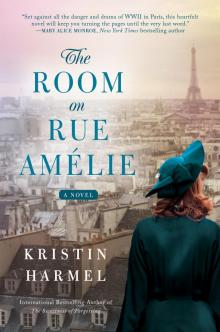 The Room on Rue Amélie
The Room on Rue Amélie The Winemaker's Wife
The Winemaker's Wife The Forest of Vanishing Stars
The Forest of Vanishing Stars The Book of Lost Names
The Book of Lost Names Italian for Beginners
Italian for Beginners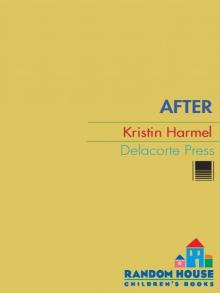 After
After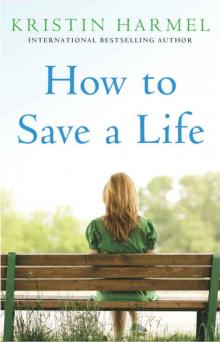 How to Save a Life
How to Save a Life The Blonde Theory
The Blonde Theory The Sweetness of Forgetting
The Sweetness of Forgetting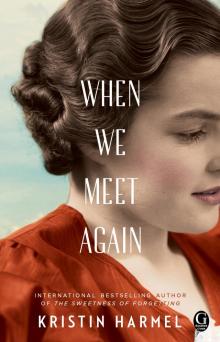 When We Meet Again
When We Meet Again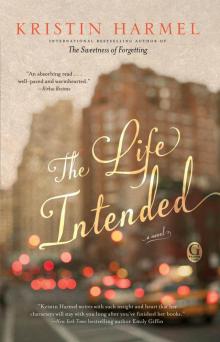 Life Intended (9781476754178)
Life Intended (9781476754178)